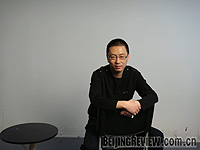|
 |
|
Song Qiang, co-author of the bestseller Unhappy China (COURTESY OF KONG HONG BOOK CO.) | Song Qiang is one of the five authors whose essays make up the bestseller Unhappy China: The Great Time, Grand Vision and Our Challenges. Song also co-authored another widely popular book, China Can Say No, which came out in 1996. Beijing Review interviewed Song about his expectations and other people's disapproval of this new book.
Beijing Review: Could you summarize Unhappy China?
Song Qiang: It depicts the decline of a school of ideas that has existed in China for three decades and has dominated the world-views of the country's political elites, government economists, cultural elites, editors-in-chief and even some military chiefs. One important perception of this school has been that China could avoid the troubles of a newly emerging power by employing a softer approach when dealing with the United States and Western countries. In this school, the West would care for and reward China if it could humbly accept the world's criticisms.
You wrote on your blog on April 1, "The Wall Street Journal was the first foreign newspaper to report on us 13 years ago [when China Can Say No came out]. Just as last time, this time's report is not objective either." Why?
The most obvious bias is its conclusion on reactions to the book, "Yet much of the response has been negative." Without adopting results of online readers' surveys, the report quotes bits of critics from various sources. It also mentioned blistering critiques from bloggers calling the book's nationalism "embarrassing." So this article bases the response to our book on blog articles cursing it.
I have repeatedly explained the "silent majority," as popularized by former U.S. President Richard Nixon, as those who are overshadowed by the more vocal minority. My impression of The Wall Street Journal report is that it seems to have degraded my book's influence.
Are there other examples of the foreign media misunderstanding your answers during the interviews or on contents of the book?
I don't expect them to accurately express the authors' meaning. Since 1996 we have not expected friendliness from them. Therefore, we have no complaints about the coverage.
What are the differences in China's international environment when you wrote China Can Say No and when you wrote Unhappy China?
China has proven capable in the international trade arena by its own efforts. The country is transforming itself from an export-oriented economy to a powerful sovereign economy. We demand more prominent status in the international community.
During an interview with the International Herald Leader you said, "We felt the need to write a book to tell the Chinese, especially those giving a lot of thought to international relations, whether we could break up with the West and how to prepare ourselves when that split nears." So what do we need to prepare?
We need confidence. The educated elites should not confuse their positive feelings about Western culture with our national interests. People should not take it for granted that democracy and freedom and national interests contradict each other.
We should learn from ordinary people. Just by reading comments on whether China should build an aircraft carrier, we can understand that a conditional split with the West could win people's hearts.
A 20-year-old college student I interviewed gave your book a five-out-of-five rating online. But he said the book's contents were meaningless, rather he respected your "different voice." What do you think?
As a reader, he reads with an independent mind. I believe he at least agrees with our criticism toward the opinion of majority and elites in China.
I was told that total shipments of Unhappy China had risen to 440,000 copies by April 2 while new purchasing deals still flood in from across China. Do you have a plan to write a follow-up?
If there is a follow-up, I hope more people will participate in the writing. In recent years, I have noticed the rise of some authors born in the 1970s who are penning important articles on China-centered views. I would like to suggest to my publisher to give them a platform to exhibit their arguments.
Who came up with the title Unhappy China? Do you like it?
It came from Song Xiaojun and Zhang Xiaobo. I think people cynical of this title lack common sense. I used to emphasize to book editors that in the Chinese book market, titles should take an uncommon approach, which should be decided by readers' preferences. A book's main title can be flexible while the subtitle should be more prudent. This is common sense in editing.
| 